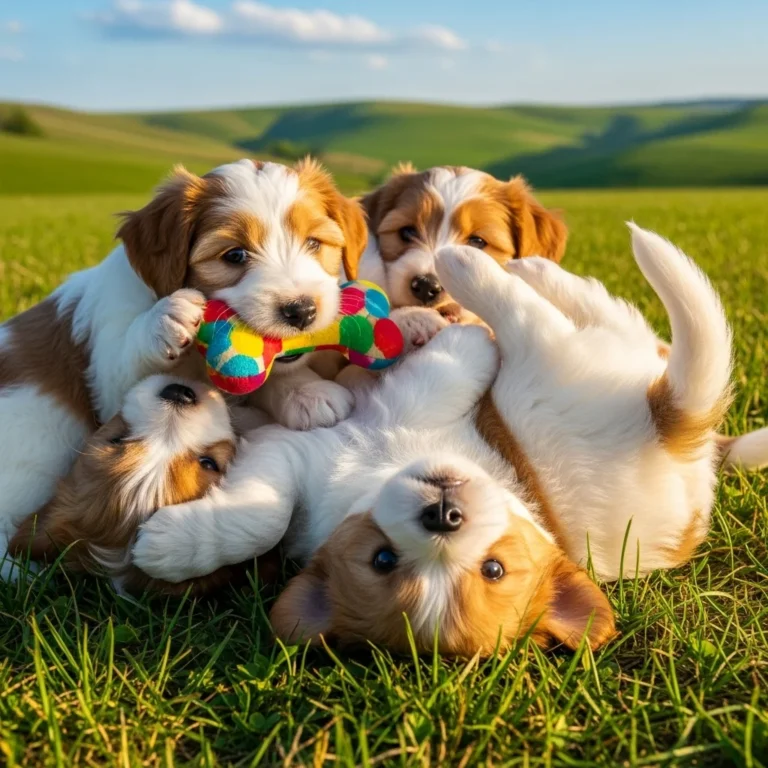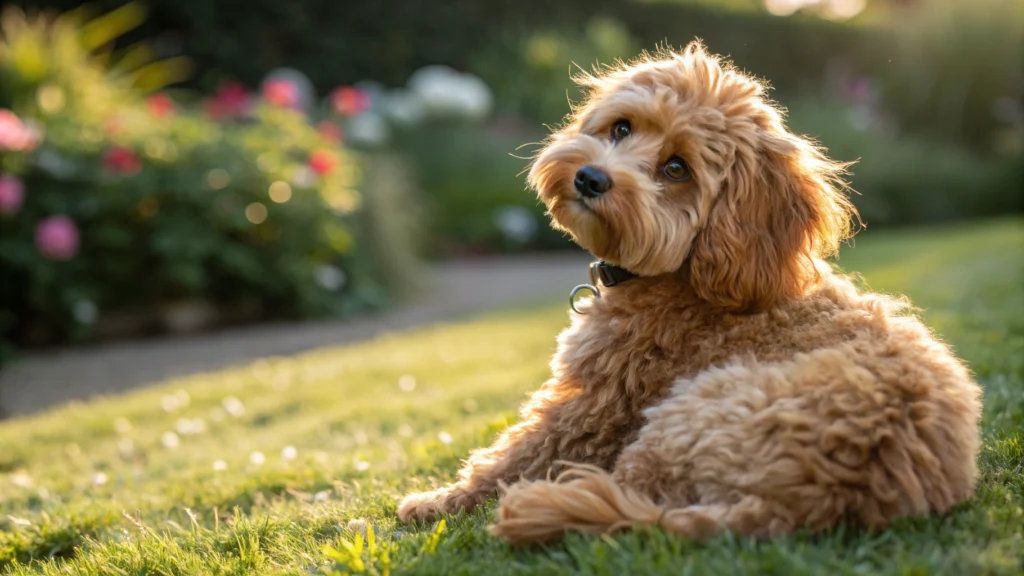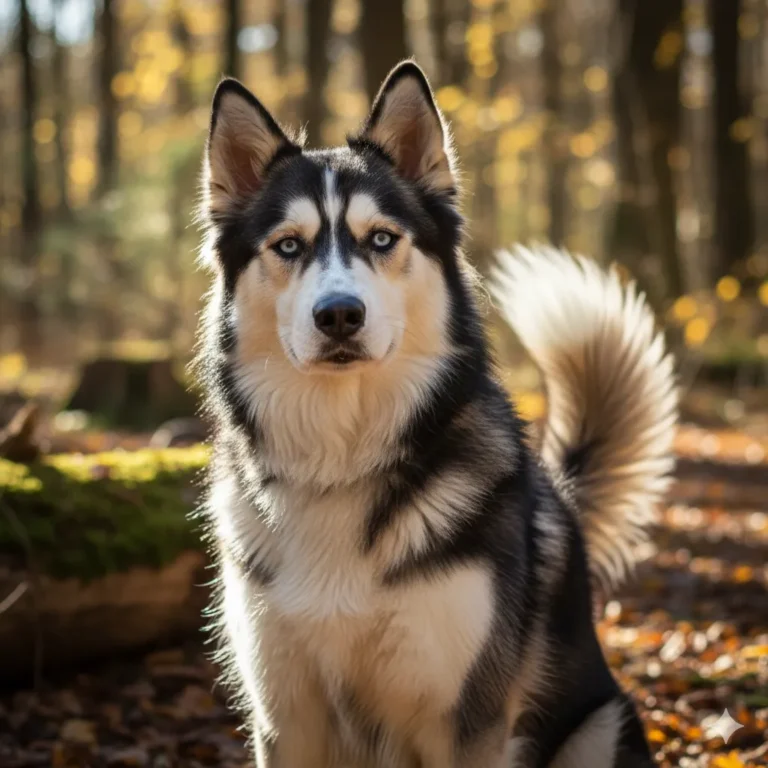
Author: DogsBlogSS Team
⚠️ Disclaimer: This article is for informational purposes only and is not a substitute for consulting a veterinarian.
golden retriever husky mix
If you’ve ever caught yourself day-dreaming about a loyal, energetic, and strikingly handsome dog that blends the warmth of a golden retriever with the spirit of a husky, then the idea of the Golden Retriever Husky Mix might just enchant you. Known more commonly by its nickname, the Goberian, this hybrid brings together two beloved breeds to create something unique: a companion who’s affectionate, bold, and full of life.
But as with any pet, there’s more beneath the surface than adorable looks and friendly wagging tails. Whether you’re already smitten with those icy blue eyes or simply considering which dog might fit your lifestyle, this full-length guide will walk you through everything you need to know—inside the heart and head of a mixed breed husky and golden retriever.
Understanding the Breed
What is a Golden Retriever Husky mix (Goberian)?
According to PetMD, The Goberian is the affectionate nickname for a crossbred dog combining the genetics of the Golden Retriever and the Siberian Husky. While it isn’t recognized as a pure breed by the American Kennel Club (AKC), the cross has become increasingly popular among dog lovers looking for something distinctive.
The idea behind the mix is to bring together the Golden’s friendly, people-oriented nature with the Husky’s high energy and striking appearance. The resulting dog often inherits a blend of traits from both sides—so every Goberian is a little different.
related:
Miniature Siberian Husky Grooming Guide
German Shepherd Husky Mix: Fun Facts & Tips
Alaskan Klee Kai: Tiny Husky, Big Personality
What does a Goberian look like?
According to DogTime, Visually, a Goberian can be quite striking. You might see the deep, caramel-gold fur and floppy ears of the Retriever parent, or the mask-like markings and piercing blue (or one blue, one brown) eyes sometimes seen in Huskies.
According to dog academy, Their coat is typically double-layered—thicker, designed for colder climates—so they often sport a plush suburban-husky look, with dense mid-length fur. Colours range from cream to golden, to grey, black, brown, and mixtures thereof.
Their ears may stand up like a Husky’s, or flop like a Retriever’s. Their tail might curl, be bushy, or simply wag high and proud. Because the mix varies, you’ll find differences in looks even within the same litter.
How big do Goberians get (weight and height)?
Size will depend heavily on which parent breed has more influence, but some averages help. According to sources:
- According to DogTime,Height: roughly 20 to 24 inches at the shoulder.
- According to DogTime,Weight: many land in the 45 to 90 lbs (about 20–40 kg) range for adult dogs.
According to PetMD,Some breeders list slightly lower typical weights (35–75 lbs) for some dogs.
As you pick a puppy, plan for a substantial medium-to-large size dog—doorways, transport, yard size, leash strength all matter.
What is the average lifespan of a Goberian?
According to DogTime, Good news: Lifespan is reasonably solid for a hybrid of this size. Most sources estimate around 10 to 15 years, depending on health, care, and genetics. Of course, lifespan is only part of the story—quality of life matters, and early care, diet, exercise, and vet check-ups all play major roles.
Are Goberians hypoallergenic? Do they shed a lot?
If you’re hoping for a low-shedding, allergy-friendly dog, take note:
- According to Adopt a Pet, Goberians are not considered hypoallergenic. Their coat inherits from both parent breeds, both of which shed.
- Shedding can be heavy, especially during seasonal coat changes (spring and fall) when the undercoat “blows”. One owner put it simply: “Shedding, some more shedding…and don’t…”
- So yes—the fur will find its way onto your sofa, clothes, friends’ laps, and probably into your vacuum routine.
In short: If you’re super sensitive to dog fur or dander, a Goberian might pose more of a challenge than a low-shed breed.
Temperament and Behavior
What is the temperament of a Golden Retriever Husky mix?
According to DogTime, From all the research: the Goberian inherits a heart full of love and a body full of energy. They tend to be warm, sociable, playful, and loyal—thanks in part to their Golden Retriever side. On the flip side, the Husky lineage contributes traits like independence, a mind of their own, strong drive for exercise, and a bit of free-spirited way of thinking. Some sources caution:
According to dog academy, “They’ll look you in the eye with intelligence and say ‘OK, but I’m doing this my way.’”
That’s a rough paraphrase, but the idea holds: training and socialisation matter.
So you get a dog who is affectionate and loyal—but also needs consistent boundaries, mental engagement, and physical activity to channel the energy.
Are Goberians good family dogs?
According to DogTime,Yes—provided the household is able to meet their needs. Goberians often thrive in family settings: they enjoy being with people, playing, interacting with children, and being part of the action.
Because they’re typically friendly and outgoing, they’re not the aloof “guard alone” type. Instead they become beloved members of the home, happy to flop beside you after vigorous play.
However, one caveat: if a Goberian is left alone for long hours without engagement, the independent streak may lead to boredom, mischief or destructive behaviour—not what you want in a “quiet house dog”.
Are they good with children and other pets?
According to dog academy, Children: Yes—they can be fantastic companions for kids. Their energy means they keep up with play and outdoor fun; their loyalty means they form strong bonds. Many sources note that with proper supervision and socialisation, they are gentle and tolerant around children.
According to Daily Paws, Other pets: This is more variable. With other dogs, especially those of similar size and energy, it’s often fine—but always introduce gradually and supervise. With smaller pets (cats, rabbits, rodents), you need to pay attention: the Husky side may carry a higher prey drive and desire to chase. Early introductions, positive reinforcement and safe supervised environments will help make the relationship smoother.
Do Goberians bark a lot?
They can bark and how can any dog NOT bark when things happen—but yes, Goberians tend to vocalise more than extremely quiet breeds. Their Husky heritage means they may “talk”, howl or bark when excited or bored. One breed guide says:
According to dog academy, “They won’t randomly bark at nothing, but if they see strangers or other activities, they may begin to bark.”
If you live in a shared apartment with noise restrictions or you’re sensitive to constant barking, this is a factor to consider.
Are Goberians aggressive?
According to Animal Corner, Generally no—they aren’t designed to be aggressive guard dogs, and many sources emphasise their friendly nature.
That said, any dog can show aggressive behaviour if improperly socialised, neglected, or fearful. With a Goberian, because they are strong, energetic and large, undesirable behaviours can become more serious if ignored. So good training, early socialisation and consistent boundaries are crucial.
Do they have a high prey drive?
Yes—this is one of the traits you’ll want to watch. The Husky side of the Goberian comes from a lineage of sled dogs and independent working dogs, and while the Goberian may inherit the friendly side of the Golden, the drive to chase, dig, explore and even escape can be strong. According to one source:
According to Dogell.com, “The breed may chase wild animals… Better keep this breed on a leash.”
If you have cats, rabbits or small pets (or live near a busy road or open area without secure fencing), you’ll want to manage the environment carefully.
Care and Training
How much exercise does a Goberian need?
According to Husky Gifts, A lot. And I mean a lot. These dogs aren’t built to nap inside all day—they want to move, explore, run and interact. Many sources recommend at least an hour or more of exercise each day, plus mental stimulation.
Examples: long walks, jogs, hiking, fetch games, puzzle toys, even swimming or sports. If you underserve these needs, you risk behavioural drift: pulling on leash, digging, howling, restlessness.
If you live in a flat or apartment, you’ll need to commit to taking them out often and ensuring they burn off that energy. A yard helps, but a yard without play is not enough.
Are Goberians easy to train?
“Relatively” is the right word. Their intelligence and eagerness to please (thanks Golden DNA) help—but the independent streak (thanks Husky DNA) sometimes means they’ll challenge commands. One breeder guide noted:
According to dog academy, “With patience and assertiveness, they respond well, but some may be stubborn.” In short: yes, they can be trained easily, but expect to put in consistent effort—early obedience classes, positive reinforcement, short fun sessions, and socialisation are all smart moves.
What kind of training is best for a Goberian?
Here are some practical tips:
- Start early: From puppyhood, socialise with people, other dogs, kids, and different environments.
- Use positive reinforcement: treats, praise, play. Avoid heavy-handed discipline—it can backfire.
- Make it fun: Because they’re smart and energetic, training sessions that feel like games work best.
- Focus on impulse control: “Sit”, “Stay”, “Leave it”, “Come” are gold. Also work on leash manners—this dog may want to pull.
- Variety and challenge: Mental games, agility, scent-work, puzzle toys help keep their minds engaged.
- Consistent boundaries: Because of their size and strength, letting them “be the boss” can lead to problems.
- Secure environment: Teach recall, and ensure they’re safe around areas where they might chase small animals or roam.
Do they need a lot of grooming?
According to dog academy,Grooming is moderate but important. The double-coat means some regular maintenance and a lot of shedding. As one source put it: brushing a few times a week helps—but you’ll still encounter fur.
Good practices:
- Brush 2-3 times per week; daily or more during “blowing coat” seasons.
- According to Husky Gifts, Bathe as needed—shaving the coat is not recommended (it can interfere with the natural insulation and coat regrowth).
- According to PetMD , Clean ears weekly (especially if outdoors/exercising a lot) because water and debris can get trapped.
- Trim nails monthly, check teeth and gums, clean or check ears for infection.
- Provide a good vacuum and lint-roller supply—they come with the territory.
What are common health issues in Goberians?
As with any mixed breed, “anything can happen”, but because the parent breeds have known conditions, you should be aware. Some of the more commonly referenced issues:
- According to DogTime, Hip and elbow dysplasia (from both parent lineages)
- According to Adopt a Pet, Eye disorders including cataracts, progressive retinal atrophy (especially from Husky side)
- According to A-Z Animals,Von Willebrand’s disease (blood-clotting disorder) in some lines.
- According to dog academy, Epilepsy and joint issues (osteochondritis dissecans) have been mentioned in breed-guide lists.
- According to DogTime, Bloat (gastric dilatation) may be a risk in larger deep-chested dogs.
To mitigate risk: choose a reputable breeder who provides health clearances for parent dogs; keep up with vet check-ups; maintain healthy weight; use good diet and exercise; and monitor for signs early (lameness, reluctance to move, eye issues, unusual bleeding).
What kind of diet is best for a Goberian?
Given their size and energy level, diet matters:
- According to A-Z Animals,High-quality dog food formulated for large breed with appropriate protein, fat, joint support (glucosamine), and calorie content.
- According to dog academy, Because they’re active, they need more calories than a sedentary small breed—but you still want to avoid overfeeding. Obesity adds strain to hips/joints.
- Puppies: large-breed puppy formulas, careful about growing too quickly, monitor for joint stress.
- Adults: feed based on activity level. If your Goberian is very active (hiking, running), you may adjust.
- Water: plenty. Especially because of thick coat and energy.
- Treats and extras: Use wisely—too many calories can offset all your good effort. Balanced vitamins/minerals from diet + vet guidance is best.
Ownership Considerations
Is a Goberian the right dog for me?
Great question—and it deserves honest self-reflection:
Yes, if you:
- Have time every day for brisk exercise and mental play (an outing, run, adventure)
- Appreciate dogs with big personalities—and can provide companionship, training and structure
- Have space (a fenced yard, safe outdoor access or a committed exercise routine)
- Are okay with shedding, hair on the floor and furniture, some vocalisation and energy
- Want a loyal, friendly dog who bonds deeply and plays hard
Maybe reconsider if you:
- Live in a very small apartment or high-rise without easy access to outdoor space and consistent exercise
- Have limited time (long work hours, frequent travel) and minimal capacity for training/play
- Are allergic to dog hair or dander (they’re not hypoallergenic)
- Prefer a low-energy, “can lounge and snooze all day” kind of dog
If you tick the “yes” boxes—they can be fantastic. If you lean toward the “maybe reconsider” side, you might still love them—but you’ll want a strong game plan in place.
How much does a Goberian puppy cost?
Costs vary a lot depending on region, breeder, pedigree, health guarantees. Estimates suggest:
- According to PetMD, One source: $300 up to about $1,500.
- According to dog academy, Another: breeder quotes between $500 and $2,000, and some designer lines maybe more.
Beyond purchase price, remember ongoing costs: food, grooming, vet care (especially with large/active dog), training, exercise gear.
Where can I find a reputable Goberian breeder or rescue?
Because they are a designer/hybrid breed (not AKC-standard), you’ll want to vet breeders carefully:
Tips:
- According to DogTime, Look for breeders who share health clearances for both parent breeds (hips, elbows, eyes, cardiac)
- Visit or ask for detailed photo/video of breeding facility, parent dogs, socialisation with puppies.
- Ask about what they do for temperament/socialisation (early exposure, children, other dogs).
- Ask about the lineage, any health issues in parent dogs, guarantee/warranty.
- According to DogTime,Consider rescue options: While breed-specific Goberian rescues may be rare, breed-agnostic rescues (golden retriever rescues, husky rescues) sometimes have mixes.
In short: take your time, ask questions, don’t rush into a purchase.
What are the pros and cons of owning a Goberian?
Pros:
- Friendly, loyal, affectionate companion
- Energetic and playful—great for active families or outdoorsy owners
- Striking appearance—beautiful coat, expressive eyes, mixes traits
- Good with children/families (when properly socialised)
- Intelligent and trainable (if training is consistent)
Cons:
- High exercise and activity needs—they are not “low-maintenance” dogs
- Significant shedding—prepare for fur and grooming
- Can be vocal, may bark or howl more than quieter breeds
- Prey drive and independence—some behaviours may need managing
- Large size and strength—requires space, strong leash/harness, caution with small children/pets
- Breed variability—because it’s a mix, you can’t predict exactly which traits will dominate.
Conclusion
Choosing a golden retriever mix siberian husky is choosing a life of joyful energy, loyal companionship and a bit of fur on the carpet. These dogs bring warmth, intelligence and beauty—but they also demand your time, space, and engagement. If you can give them the exercise, mental challenge, grooming and love they deserve—you’ll be rewarded with a fantastic dog who truly becomes part of your family. On the other hand, if you’re looking for a low-energy, low‐maintenance sofa buddy, you might find the Goberian a bit more than you bargained for..
Do you want help finding good rescue organisations or breeders (especially relevant for uSA/ Europe) for a Goberian? I’d be happy to dig into that next.
Notice : The DogsBlogSS editorial team is dedicated to providing accurate, research-based information about dog health, behavior, and care. All our articles are fact-checked using trusted veterinary sources such as VCA Hospitals, Merck Vet Manual, and the AKC.
you may like it
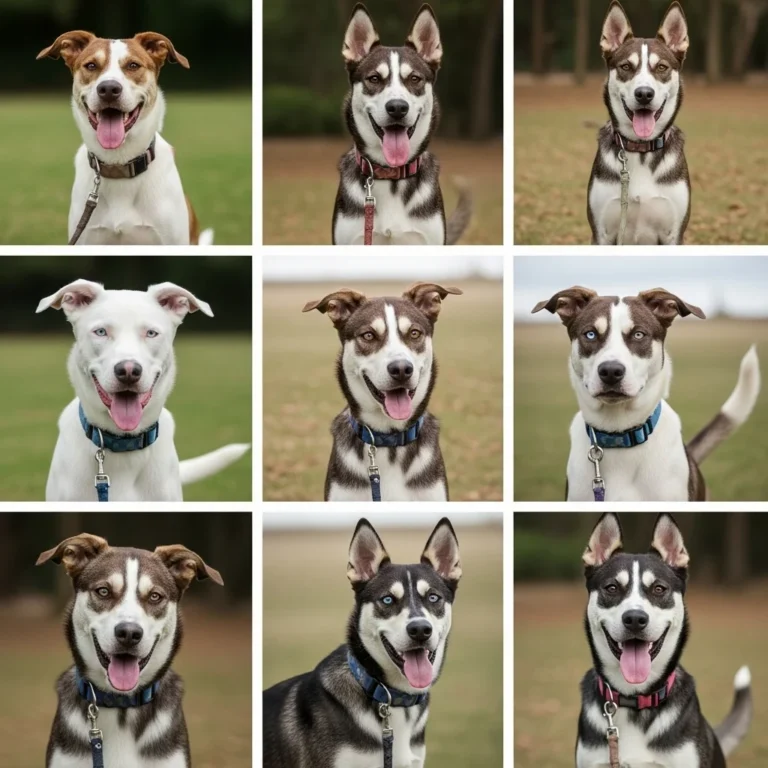
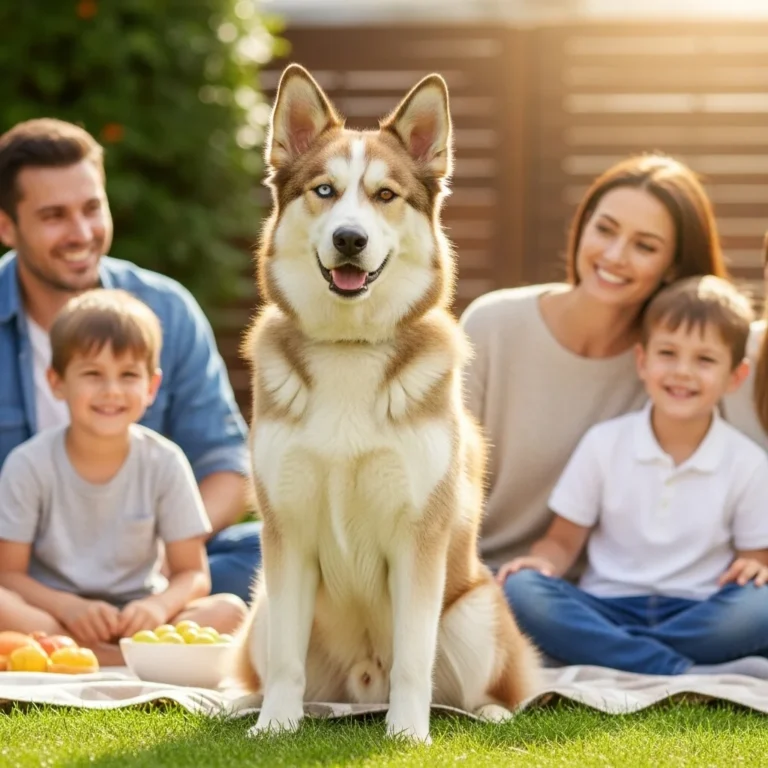
sources
- https://www.petmd.com/dog/breeds/goberian
- https://dogtime.com/dog-breeds/goberian
- https://dogacademy.org/breeds/goberian
- https://huskygifts.com/golden-retriever-husky-mix
- https://adoptapet.com/dog-breeds/goberian
- https://animalcorner.org/dog-breeds/goberian
- https://a-z-animals.com/animals/goberian
- https://dailypaws.com/dogs-puppies/dog-breeds/goberian
- https://dogell.com/en/dog-breed/goberian

